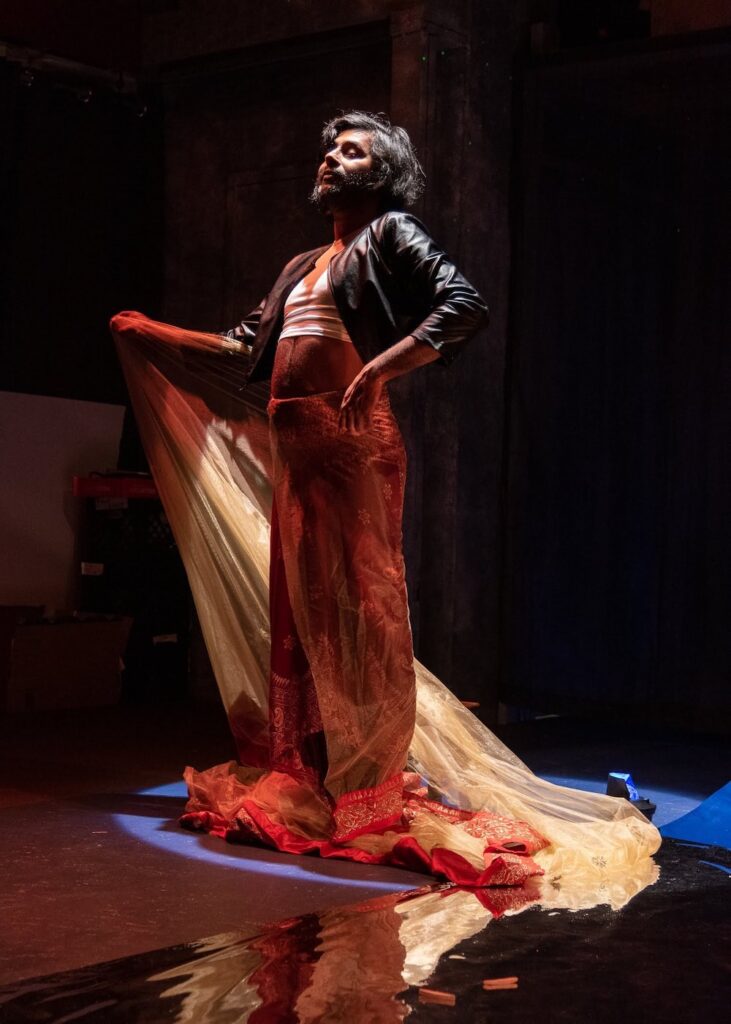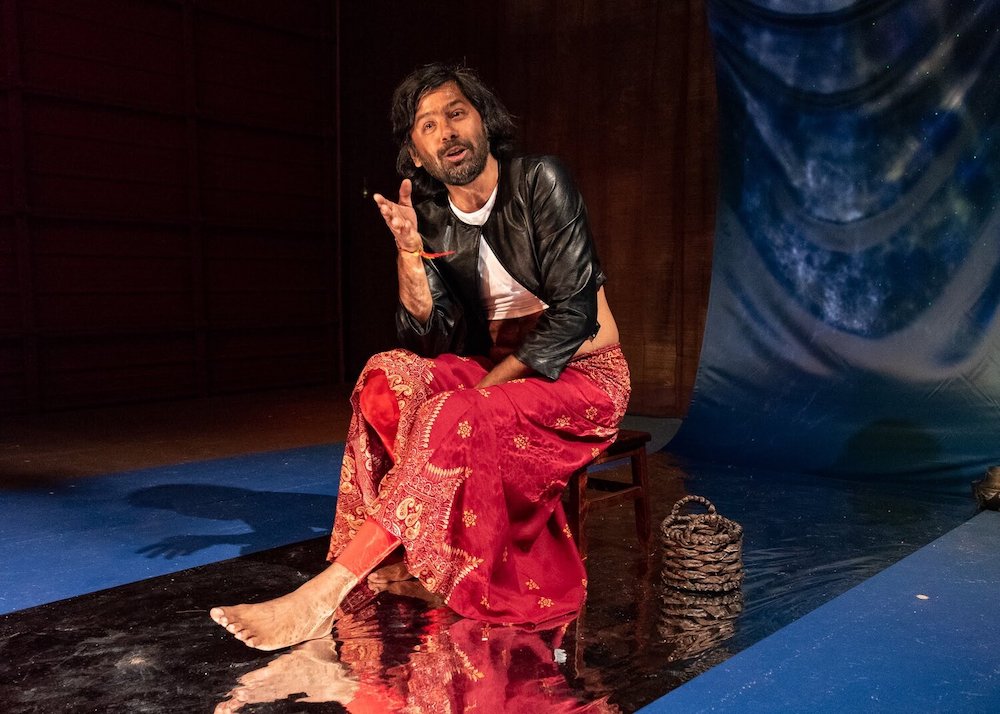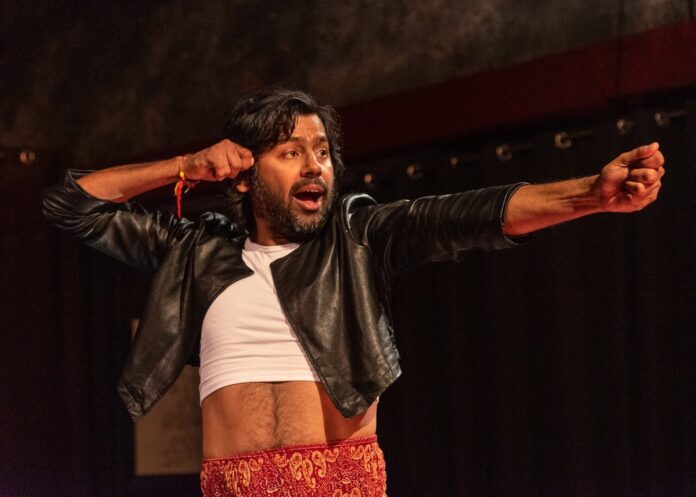Just how much is too much of a good thing?
One may go into Geetha Reddy’s one-person recitation of the Mahābhārata (runs through August 20 at Z Space) already knowing that it’s based on an extremely abridged version of the supposedly longest poem in human history. This is not problem in principle. In fact, there are many entertaining theatrical works whose whittling-down of long-winded texts is half the fun, from Tom Stoppard’s 15-Min Hamlet to Megan Cohen’s Take Me Home: A One-Woman Odyssey.
In the ancient pre-pandemic days of 2019, Reddy and the Oakland Theater Project staged this version of the Indian tome, full of countless stories about war, royalty, passion, revenge, and the interference of the gods. Now, as directed by OTP co-AD Michael Socrates Moran, company member J Jha (they/them) returns to the two-hour-plus performance that wowed audiences.

Jha, whom many of us know from their administrative work with Theatre Bay Area, is indisputably the show’s biggest strength, breathlessly storming through one story to the next from the 100,000-verse tome. What’s more, they do so in a “quite sassy” style that has our narrator alternating between “parent doing voices for a child’s bedtime story” and “friend so eager to spill the tea they just can’t hold back.”
So energetic is Jha that it’s easy to lose track of which story is being told, which is a problem when you’re not familiar with the text. I walked into show knowing pieces of the stories—the baby born in gold armor, the prince who shoots the false bird in its eye—but not enough to easily pick up again when Reddy jumps back-and-forth in the narrative.
Imagine a retelling of Bible stories for those unfamiliar that starts with Moses, jumps ahead to Ephesians, jumps back to Esther and Ezra, spends a long time on the Song of Songs, and then speed-reads all the Psalms before finally mentioning The Book of Revelations. That might conjure a similar feeling to sitting through Jha’s whirlwind recitation of Reddy’s text. Entertaining raconteur or not, one can’t be blamed for being no more an expert on Indian mythology by the end. (I used to frequently collaborate on a Greek mythos theatre fest, and this same sort of confusion was one of the most frequent complaints I heard.)

Which is a shame, because Moran actually employs a solution that would clear the narrative fog if it were employed more: visual aids. Before the audience enters the Z Space main theatre, the lobby has us walk past a family tree chart attempting to keep straight several of the characters we’re about to see dramatized. The chart has no images, just black text on a white background. It’s actually brought on stage at one point. Had this sort of referential material been omnipresent for the entire show, it would have been easier to keep track of who is whom. Perhaps different lighting or costumes for different characters? Maybe the images of the characters projected on the screen above the stage? Anything to let us know whom we’re seeing portrayed without feeling like we’re lost in the woods.
The projection screen (with imagery by Alexa Burrell) is just one of the unique elements in the unorthodox quasi-thrust stage designed by Moran and conceived by Karla Hargrave. Although produced in the grand hall that is Z Space, the show tries to go black box by blocking off the theatre’s usual raised seats and placing both audience and performer on the stage. The audience are divided into two groups, seated on either side of mirrored floor (resembling a pond or stream) with purple petals all around it. The projection screen hangs about 10 feet above, with lotus blossoms hanging from strings at either end of the screen.
Help us save local journalism!
Every tax-deductible donation helps us grow to cover the issues that mean the most to our community. Become a 48 Hills Hero and support the only daily progressive news source in the Bay Area.
Evana Schibinger’s costumes (via Regina Evans) place a barefoot Jha in a red sari skirt with gold design. The first act features them in a leather jacket, whilst the latter-half sees them in a white blouse. The looks are similar, but different enough that it just made me further wish that more costume elements had been used for different characters to help keep track of them.
Though OTP usually has a strong mask mandate for their shows at FLAX in Oakland, Mahābhārata is, unfortunately, going by Z Space’s non-existent COVID safety measures. To the production’s credit, the large open space of the main stage allows for a great airflow, even indoors. I was maybe one of three people masked (not counting stagehands) in an audience of 20-plus, and I was pleasantly surprised to see that my Aranet4’s CO² readings held steady at around 520ppm for the entire two-act show. I’d have felt safer with a mask and vax mandate, but that has to be the lowest CO² rating I’ve ever seen indoors.
At the start of the show, our narrator tells us that the Mahābhārata is “longer than The Iliad and The Odyssey put together” and that it would “take 12 days” to recite it in its entirety. By the end of the show, we’re told that not only do the stories within it change with each telling, but that this variety is the point: take the familiar and make it your own. I don’t know much about the original text, but I can say that Jha certainly did. Our excitable storyteller never lets on that any of it is more than they can handle, which is a relief when dealing with such a dense text. The stories are intriguing, the direction is tight, and the performer is game for the task. Had Mahābhārata made reference material a crucial part of its presentation, it would be that much closer to perfect.
MAHĀBHĀRATA runs through August 20. Z Space, SF. Tickets and more info here.






